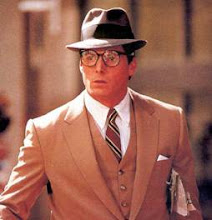As a writer, i think I would be able to do this. It would require much more time and effort on my part, but I presume it's possible, even for an undergrad like myself. I would wonder about the truth of my statements and presumptions/examples, however. If I don't talk to the subject, how can I be sure my profile is an accurate representation of his/her person. I suppose in some ways, observing the person for such an extended period may prove more accurate in the long run. Subjects lie and change facts/mold histories when you speak to them directly; people are fallible. During an interview, subjects try to put the best version of themselves on display. hmmm...
I felt "The Road is very Unfair" was an interesting article. It was so long, however, that I felt, at times, the focus on AIDS was lost. I would become absorbed by the stories of individual characters, by the dangers they faced (in this instance, not sexually-transmitted dangers), by the history of the region, and the journey of the trucking convoy. I thought the article ended oddly; the focus on the previously unknown/not mentioned turnboy. I felt the ending was hurried, that Conover tried to summarize his focus too simply and sweetly.

I agree with your ideas on The Road is Very Unfair. It was a longer article on a pretty intense subject--how can you end such a story with just as much intensity or resolution? It felt a little hurried to me too and I was confused as to how it all of a sudden picked up when the rest was very well detailed and drawn out.
ReplyDeleteI totally agree with the ending. What did it mean? What was he trying to say with that? was it emphasizing 'Africa's fatalism'? awkward..
ReplyDeleteI also think i could do and like to report on a person like Talese did with Sinatra. It's kinda creepy and stalkerish, (then he took one step left, scratched his nose, and put a hand in his pocket) but i also think that would make it really fun.
I felt that the focus was lost in "The Road is very Unfair" too. In fact, I didn't really know what the focus was until you identified it in this post. I couldn't decide if it was a profile of the truckers, of the place, or an immersion/explanatory piece on AIDS or on truck driving or being an American in Africa or what.
ReplyDeleteI agree with everything that's being said about "The Road is Very Unfair," but for some reason I want to defend it. I think the ending ties the whole piece together because it is another instance that shows that AIDS is still a very taboo topic in Africa, and that because people aren't being honest about it and aren't admitting the severity of its consequences, it's taking all of these anonymous lives. I agree that the article was convoluted, but I think a lot of the issues had to be there to show how they feed into the AIDS issue (for example, his experience of being an American in Africa shows a lot about the ways the "West" has influenced Africa and how westerners are viewed, which I think relates to the fact that a lot of the fight against AIDS in Africa is pushed by the West).
ReplyDelete